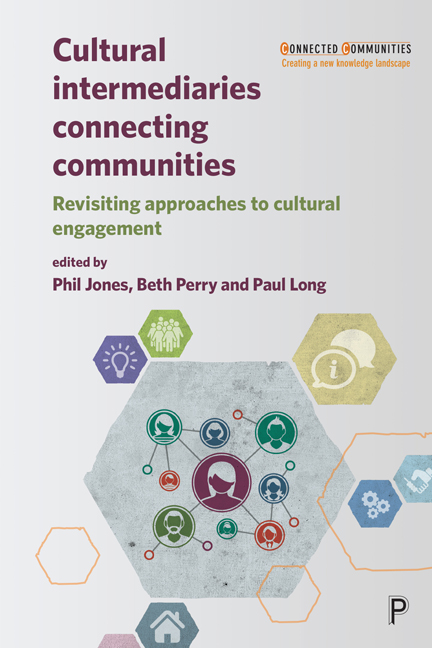Book contents
- Frontmatter
- Contents
- List of figures, tables and boxes
- Notes on contributors
- Acknowledgements
- Series editors’ foreword
- Introduction: Bringing communities and culture together
- Part One Changing contexts
- Part Two Practices of cultural intermediation
- Part Three Evaluation, impact and methodology
- Conclusion: where next for cultural intermediation?
- Index
fourteen - Intervention: street art, faith and cultural engagement
Published online by Cambridge University Press: 30 April 2022
- Frontmatter
- Contents
- List of figures, tables and boxes
- Notes on contributors
- Acknowledgements
- Series editors’ foreword
- Introduction: Bringing communities and culture together
- Part One Changing contexts
- Part Two Practices of cultural intermediation
- Part Three Evaluation, impact and methodology
- Conclusion: where next for cultural intermediation?
- Index
Summary
I used to describe myself as an artist – a visual artist in particular: I’m known as a graffiti artist, or in more refined terms as a ‘mural painter’ or any other posh term that you might use. If I am honest, nothing beats painting: taking over a big concrete wall in a public space and creating something meaningful, I enjoy that. I am also the founder of Soul City Arts, a cultural organisation located in the Sparkbrook area of Birmingham that serves the locality and city while working with an international scope.
In this chapter, I want to give an account of my origins, motivation and work as a creative worker and intermediary. I have found it difficult to capture what I do as where I started in cultural work and where I am now has expanded in productive and rewarding ways. Nonetheless, it is a useful exercise to take stock of this process in order to offer insights and reflections on the nature of such work in the context of this collection, the wider project framed by it, and the general field of policy support, directives and expectations. Some of this detail may resonate with the broader themes identified by the scholarly work collected here as well as with the wider fields which it references. I would like to hold onto the particularity of what I do, however, which I hope I have conveyed here.
Although I excelled in art from an early age, I rebelled against the idea of a career in fine art, although I did gain a degree in multimedia design. I was very much focused on the kind of paying job I could get, influenced to a great degree by growing up in a working-class family of Bangladeshi origin and the expectations of security to be garnered from education. At the time, I never understood why my parents wanted me be a doctor, engineer or whatever rather than indulging my creative instincts. As they used to say: “We want you to be well paid. We don't want you to struggle like we did”. Now I get it: being in the arts world and trying to make a living, reputation and to produce meaningful work is a challenge.
- Type
- Chapter
- Information
- Cultural Intermediaries Connecting CommunitiesRevisiting Approaches to Cultural Engagement, pp. 199 - 206Publisher: Bristol University PressPrint publication year: 2019

